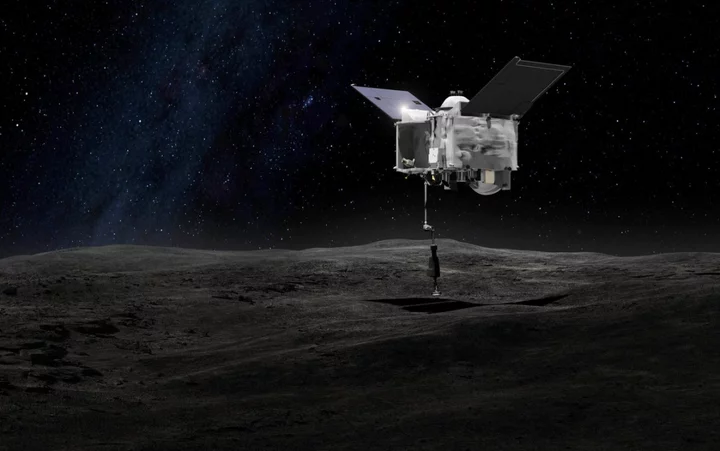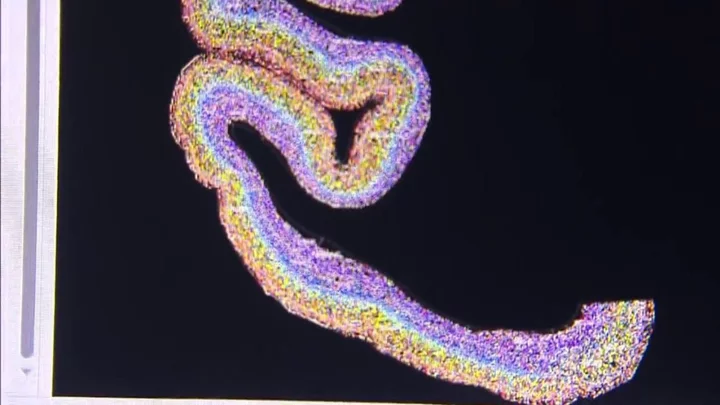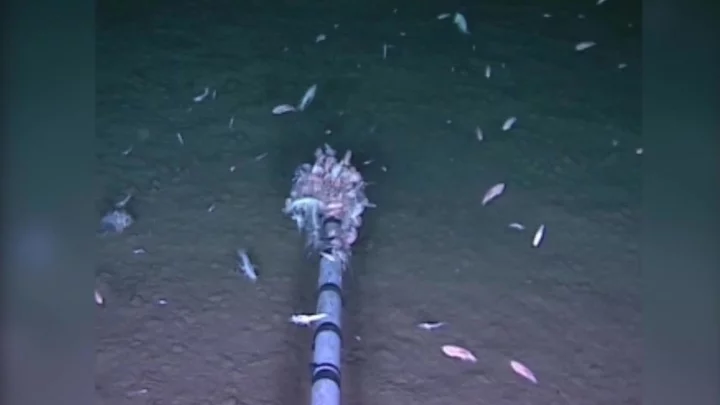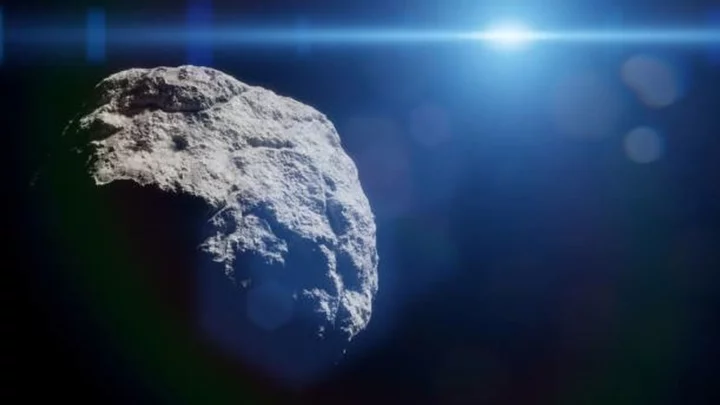
Shopify invests in wholesale platform Faire
LONDON E-commerce giant Shopify is investing in wholesale platform Faire, the companies said on Wednesday, in a global
2023-09-27 18:58

Baltimore police searching for 'extremely dangerous' ex-con in killing of 26-year-old female tech CEO
Baltimore police continue to search for an "extremely dangerous" man suspected of murdering 26-year-old tech CEO Pava LaPere, who was found dead in an apartment building on Monday.
2023-09-27 18:54

US investors want clarity on Biden's vague curbs on China tech
By Pete Schroeder, Michelle Price and Carolina Mandl WASHINGTON/NEW YORK U.S. financial firms are pushing for greater clarity
2023-09-27 18:15

Hollywood writers' deal may set a template for talks with striking actors
By Dawn Chmielewski and Lisa Richwine LOS ANGELES The tentative deal Hollywood writers reached with the major studios
2023-09-27 16:48

Amazon faces landmark monopoly lawsuit by FTC
By Diane Bartz WASHINGTON The U.S. Federal Trade Commission filed a long-awaited antitrust lawsuit against Amazon.com on Tuesday
2023-09-27 04:26

US Supreme Court extends pause on order curbing Biden social media contacts
By Nate Raymond and Andrew Chung U.S. Supreme Court Justice Samuel Alito on Friday extended a temporary block
2023-09-26 20:55

Huawei starts product launch event by thanking China for its support
By Yelin Mo and Brenda Goh BEIJING/SHANGHAI (Reuters) -Huawei Technologies kicked off a product launch event on Monday by thanking
2023-09-25 16:51

Pieces of Asteroid Bennu about to come to Earth as part of Nasa’s Osiris-Rex mission
Scientists are preparing to receive pieces of a distant asteroid, which will fall to Earth over the weekend and could reveal where we came from. On Sunday, a sample collected by a Nasa spacecraft that landed on Asteroid Bennu will float down into the Utah desert, where it will be gathered by scientists. They will then start work on analysing that material, in the hopes of understanding how planets form and what our solar system was like in its distant past. Nasa sent its Osiris-Rex spacecraft to Bennu in 2016, and it touched down on the distant asteroid in 2020, and scooped up a piece. Since then, it has been flying back towards Earth to drop the sample back home. The sample dropped out of Osiris-Rex will float down into the desert, helped by a parachute that should safely allow it to fall to the ground. The spacecraft itself will continue to fly, on its way to start a new mission to study another asteroid towards the end of the decade. It is the US space agency’s first mission to collect a sample from an asteroid, and is the largest asteroid sample ever returned to Earth. The capsule is estimated to hold around 250g of rocks and dust collected from the asteroid’s surface. Nasa will release a quarter of the sample to a group of more than 200 people from more than 35 globally distributed institutions, including a team of scientists from The University of Manchester, and the Natural History Museum. Asteroid Bennu is a 4.5-billion-year-old remnant of our early solar system and scientists believe it can help shed light on how planets formed and evolved. Experts say the carbon-rich, near-Earth asteroid serves as a time capsule from the earliest history of the solar system. It is anticipated that the sample will provide important clues that could help us to understand the origin of organics and water that may have led to life on Earth. Because the sample has been collected directly from the asteroid, there will be almost zero contamination. Meteorites that fall to Earth are quickly contaminated from the second they make contact with our atmosphere. This means Bennu can give us an unspoiled glimpse into the past. Ashley King, UKRI future leaders fellow, Natural History Museum, said: “Osiris-Rex spent over two years studying asteroid Bennu, finding evidence for organics and minerals chemically altered by water. “These are crucial ingredients for understanding the formation of planets like Earth, so we’re delighted to be among the first researchers to study samples returned from Bennu. ‘We think the Bennu samples might be similar in composition to the recent Winchcombe meteorite fall, but largely uncontaminated by the terrestrial environment and even more pristine.” Dr Sarah Crowther, research fellow in the Department of Earth and Environmental Sciences at The University of Manchester, said: “It is a real honour to be selected to be part of the Osiris-Rex Sample Analysis Team, working with some of the best scientists around the world. “We’re excited to receive samples in the coming weeks and months, and to begin analysing them and see what secrets asteroid Bennu holds. “A lot of our research focuses on meteorites, and we can learn a lot about the history of the solar system from them. “But meteorites get hot coming through Earth’s atmosphere and can sit on Earth for many years before they are found, so the local environment and weather can alter or even erase important information about their composition and history. “Sample return missions like Osiris-Rex are vitally important because the returned samples are pristine, we know exactly which asteroid they come from and can be certain that they are never exposed to the atmosphere so that important information is retained.” The spacecraft launched on September 8, 2016 and arrived at Bennu in December 2018. After mapping the asteroid for almost two years, it collected a sample from the surface on October 20, 2020. The capsule is expected to land at 3.55pm (BST). Astrophysicist Professor Boris Gansicke, Department of Physics, University of Warwick, said: “The asteroids in our solar system contain the raw building blocks from which the Earth was made, so working out their composition will tell us a lot of how our planet formed. “There are many open questions, for instance where did the water that we have on Earth come from? And where did the ingredients that made life possible to develop come from? “To answer those questions, i.e. measure the composition of an asteroid, you need to get your ‘hands’ on them (or in this case the arm of a space mission), and this is what Osiris-Rex achieved. “In a nutshell, it’s similar to sitting in front of a delicious dinner and wanting to have the list of ingredients.” Additional reporting by agencies Read More You need to update your Apple devices right now Amazon Prime Video will soon start running ads – unless you pay even more Amazon Prime Video will soon start running ads unless you pay a monthly fee You need to update your Apple devices right now Amazon Prime Video will soon start running ads – unless you pay even more Amazon Prime Video will soon start running ads unless you pay a monthly fee
2023-09-23 00:21

Scientists discover strange 'mathematical pattern' in the human body
The human body is a marvel of science and researchers have discovered a strange reoccurring mathematical pattern within its cells. Our bodies are made up of a massive variety of individual cells with countless different functions, from neurons in our nervous system to the oxygen carriers that all work in harmony to keep us alive. Experts from scientific research institutions in Germany, Canada, Spain, and the US have worked together on a study to determine just how many cells of each type there are in the human body and the results are staggering. They found that most adult males possess around 36 trillion cells, while adult females have in the region of 28 trillion cells. For a 10-year-old child, they have around 17 trillion. Interestingly though, scientists discovered that, regardless of the total number of cells, if they are grouped according to their function, the proportions for each individual remain the same. The researchers explained in their findings: “These patterns are suggestive of a whole-organism trade-off between cell size and count and imply the existence of cell-size homeostasis across cell types.” Scientists believe there is a natural balancing act at play between different cell types with new cells being produced to maintain the balance. The body produces fewer larger cells (such as muscle fibres) and more smaller cells (like blood cells). It is hoped that future studies will be able to uncover exactly how this happens and how bodies seem to naturally regulate cells. They explained that all cells are perfectly sized for their roles and any deviation from their scale can indicate the presence of disease. Experts have made their data, analysis and results public in the hopes that future studies into biology will be able to utilise their research. Sign up to our free Indy100 weekly newsletter Have your say in our news democracy. Click the upvote icon at the top of the page to help raise this article through the indy100 rankings.
2023-09-22 23:15

Despite risks fish farms are booming in Africa
Farming fish has seen rapid growth in Africa but it can be an expensive, high-risk operation.
2023-09-22 07:50

Scientists have found a novel virus at the bottom of the ocean
Scientists have discovered a new virus in the Pacific that is thought to be the deepest ever found in Earth’s oceans. The so-called bacteriophage virus infects and replicates inside bacteria, and was found in the Mariana Trench, which is the Pacific’s deepest point. Bacteriophages are among the world’s most abundant life forms, and are important for regulating population sizes in the oceans and releasing nutrients. This one, the catchily named vB_HmeY_H4907, was picked up at 8,900 metres below sea level. That is still some way off the 11,000 metre floor of the trench. Min Wang, a marine virologist from the Ocean University of China, said: “To our best knowledge, this is the deepest known isolated phage in the global ocean.” “Wherever there’s life, you can bet there are regulators at work. Viruses, in this case.” Scientists think this virus is likely to be distributed widely in the world’s oceans, despite the fact it has only been discovered. It has a similar structure to its host bacteria group halomonas. These are usually found in sediments and geyser-like openings on the seafloor. They also think the virus is lysogenic, which means it infects the host but does not kill it. Dr Wang said the discovery could inform further research about how viruses survive in the world’s harshest environments. “Extreme environments offer optimal prospects for unearthing novel viruses,” he added. The virus was found in the so-called hadal zone, which the study’s authors said is “the planet’s least explored and most mysterious environment, and it is the deepest habitat for life on Earth’s surface”. The area is named after Hades, the Greek god of the underworld. Researchers wrote in the study: “These findings expand our understanding of the phylogenetic diversity and genomic features of hadal lysogenic phages, provide essential information for further studies of phage-host interactions and evolution, and may reveal new insights into the lysogenic lifestyles of viruses inhabiting the hadal ocean.” The findings were published in the journal Microbiology Spectrum. Sign up to our free Indy100 weekly newsletter Have your say in our news democracy. Click the upvote icon at the top of the page to help raise this article through the indy100 rankings.
2023-09-21 20:58

Scientists issue warning about asteroid heading to Earth with force of 24 atomic bombs
Scientists are on alert after NASA confirmed there is a chance an asteroid the size of the Empire State Building could come smashing into Earth. The asteroid is named Bennu after the ancient Egyptian bird god and has been on the space agency’s radar for a long time as they try to prevent it from coming crashing into our planet. Bennu has been categorised as one of the two “most hazardous known asteroids” and, despite the chance of impact standing at 1-in-2,700, it could strike the Earth with the force of 24 times that of the largest nuclear bomb – 1,200 megatons of energy. The carbon-based asteroid is approximately 510 metres wide and experts predict that it will come closest to hitting Earth on September 24, 2182. While the asteroid is quite sizeable, it is not quite as sizeable as the six-mile-wide asteroid which almost completely wiped out the dinosaurs. But, NASA warns that Bennu “could cause continental devastation if it became an Earth impactor”. A space mission launched using NASA’s OSIRIS-REx spacecraft has successfully taken a sample from Bennu in order for scientists to better understand the potentially dangerous asteroid. On Sunday (24 September) a capsule of the material will be dropped by OSIRIS-REx and returned to Earth where it will be retrieved and the matter inside studied. Davide Farnocchia of NASA's Jet Propulsion Laboratory told the Science Journal: “We improved our knowledge of Bennu's trajectory by a factor of 20.” As scientists work to investigate how much of a risk it could cause, Farnocchia added: “In 2135, we'll know for sure.” Sign up to our free Indy100 weekly newsletter Have your say in our news democracy. Click the upvote icon at the top of the page to help raise this article through the indy100 rankings.
2023-09-21 20:26
